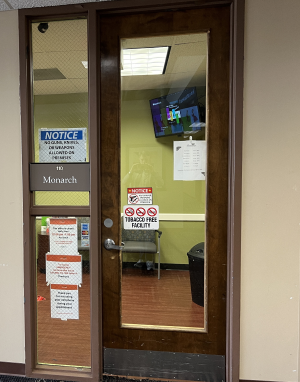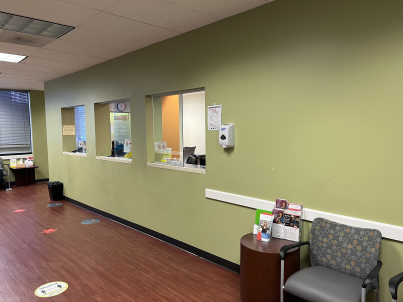Monarch’s behavioral health program is located at 5700 Executive Center Dr in this building at East Charlotte. Their appointment number is (704) 525-3255.

They are a comprehensive out-patient service for all manners of mental health issues; including Outpatient Therapy and Mental Health Services, Medication Management, Substance Use Disorder and Addiction Treatment, Tailored Care Management, Assertive Community Treatment Team (ACTT), Individual Placement and Supported Employment Services, Intensive In-Home Services, Community Support Team, Peer Support Services, Facility-Based Crisis Services, SECU Youth Crisis Center, a Monarch program Long-Term Group Homes – Mental Illness. See the details of their programs below…

One of the great things they do is provide a clear referral path for Case Managers to refer clients. You can see it at this link: https://monarchnc.org/referrals/ Here’s a look at their waiting room.To be clear they are an out-patient only facility but they take all types of insurance including Medicaid. So they turn no one away.
Community Support Team (CST)
Community Support Team (CST) services consist of community-based mental health and substance use rehabilitation services and necessary supports provided through a team approach to assist adults in achieving rehabilitative and recovery goals. It is intended for individuals with mental illness, substance use disorders, or both who have complex and extensive treatment needs. This is an intensive community-based rehabilitation team service that provides direct treatment and restorative interventions, as well as case management.
CST is designed to:
• reduce presenting psychiatric or substance use symptoms and promote symptom stability
• restore the individual’s community living and interpersonal skills
• provide first responder intervention to deescalate the current crisis
• ensure linkage to community services and resources. This team service includes a variety of interventions that are available 24 hours a day, 7 days a week, 365 days a year and are delivered by the CST staff, who maintain contact and intervene as one organizational unit. CST services are provided through a team approach.
·Assertive CommunityTreatmentTeam (ACTI)
Assertive Community Treatment (ACT) is a service model provided by community-based, mobile mental health treatment teams. The ACT team approach is designed to provide comprehensive psychiatric treatment, rehabilitation, and support to persons with Serious and Persistent Mental Illness, or personality disorders with severe functional impairments, to live independently in the community. Persons served by ACT often have co-existing problems such as homelessness, substance abuse, frequent hospitalization, and/or involvement with the judicial system,
Clients typically served by ACT teams often have needs that have not been effectively addressed by traditional, less intensive services. Team members work with clients in their homes, work setting, or places in the community where additional support might be needed. ACT is a step up from CST and provide a more intensive service for a higher risk population.
In Home Therapy Services (IHTS)
In Home Therapy Services (IHTS) is a combination of evidence-based therapy services and coordination of care interventions to be provided in the home setting for individuals with complex clinical needs that traditional outpatient cannot adequately address in a time-limited fashion. For some individuals in high-risk situations, such as families involved in domestic violence or child protective services, for whom traditional outpatient services alone are not sufficient to address the needs and prevent future incidents, IHTS may be able to address their needs more effectively.
The population targeted for this program is children and adolescents in need of individual and family therapy services, as well as coordination of care due to complex psychosocial situations and/or multisystem involvement. These are not individuals whose mental health needs have reached a severity level that puts them at risk for residential treatment or other forms of out-of-home placement, but rather individuals who need focused family systems work and coordination. Children and adolescents appropriate for IHTS have family systems issues that are complicating factors placing them at risk rather than the severity of the diagnosis alone. These activities also can be provided through face-to-face interventions with schools, juvenile justice system, etc. to quickly address any issues that arise rather than having to wait for issues to become so ·severe that the individual meets special population criteria for care coordination.
Intensive In Home Therapy Services (IIHS)
Intensive In-Home (IIH) service is a team approach designed to address the identified needs of children and adolescents, who due to serious and chronic symptoms of an emotional, behavioral, and/or substance use disorders, are unable to remain stable in the community without intensive interventions. These individuals whose mental health needs have reached a severity level that puts them at risk for residential treatment or other forms of out-of-home placement. This team provides a variety of clinical rehabilitative interventions available 24 hours a day, 7 days a week., 365 days a year.
This is a time-limited, intensive child and family intervention based on the clinical needs of the youth (through the age of 20 for Medicaid-funded services and through the age of 17 for State-funded services).
The service is intended to:
• reduce presenting psychiatric or substance use symptoms,
• provide first responder intervention to diffuse current crisis,
• ensure linkage to community services ·and resources, and
• prevent out of home placement for the child.
IIHS is a step up from IHTS and providers more intensive services for those at higher risk.
Individual Placement and Support (IPS)
Individual Placement and Support is a person-centered, behavioral health service with a focus on employment, that provides assistance in choosing, acquiring, and maintaining competitive paid employment in the community, for individuals 18 years and older, for whom employment has not been achieved or employment has been interrupted or intermittent.
The target populations for this model are individuals with serious to severe and persistent mental illness (SPMI), and co-occurring disorders. This service is provided by Employment Support Professionals (ESPs) and Employment Peer Mentors (EPMs) who are trained in national research standards that support the vocational needs of individuals and promote community connections and employment success.
Psychosocial Rehabilitation Services (PSR)
Psychosocial Rehabilitation is a day service which provides skill development activities, life skills development to support educational progress, and pre-vocational training to adults and elderly adults who have serious mental illness or severe and persistent mental illness. This service is designed primarily to serve recipients who have an impaired role functioning that adversely affects their ability to perform day-to-day routine activities.
Community integration activities for the purpose of adaptive skill training and enhancement are part of this structured setting. lt includes activities for the recipient with chronic mental illness who has a history of psychiatric hospitalization or who is at-risk of decomposition and is in need of a structured setting to prevent relapse and to facilitate community adjustment. The service is designed for individuals with serious mental illness or severe and persistent mental illness who have impaired role functioning that adversely affects at least two of the following: employment, management of financial affairs, ability to procure needed public support service, appropriateness of social behavior, or activities of daily living. Assistance is also provided to service recipients in organizing and developing their strengths and in establishing peer groups and community relationships.
Leave a Reply